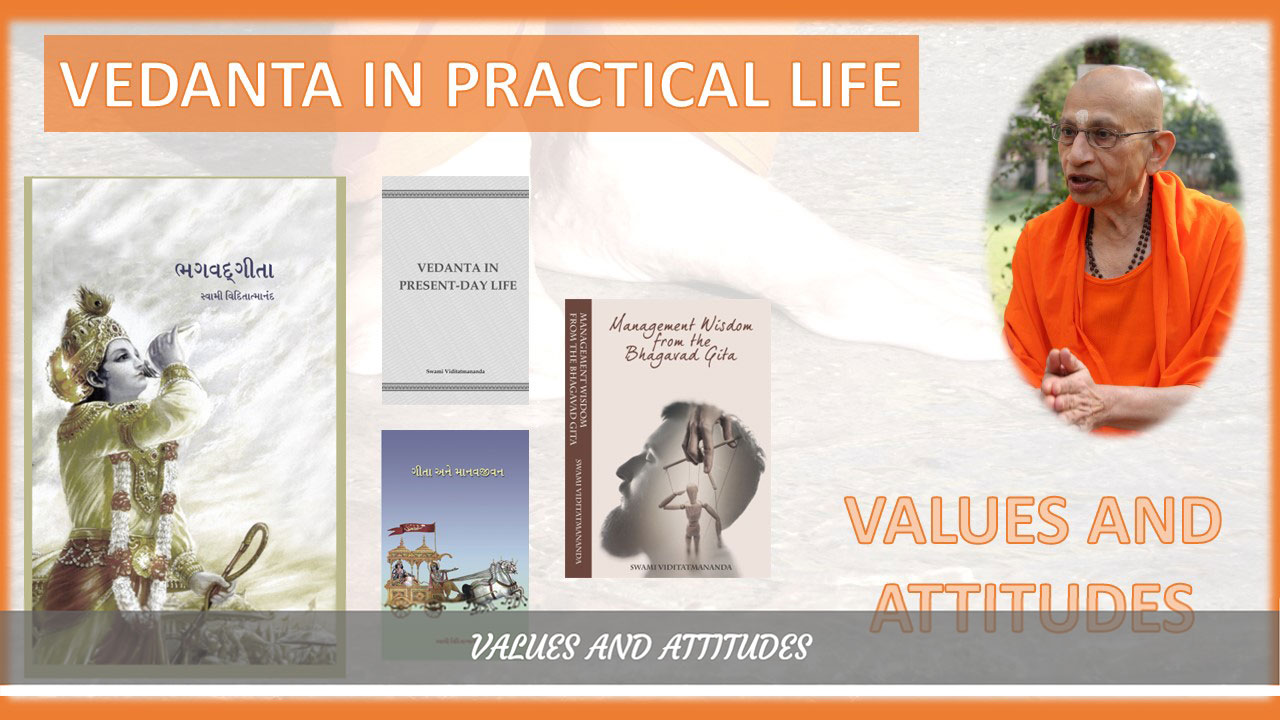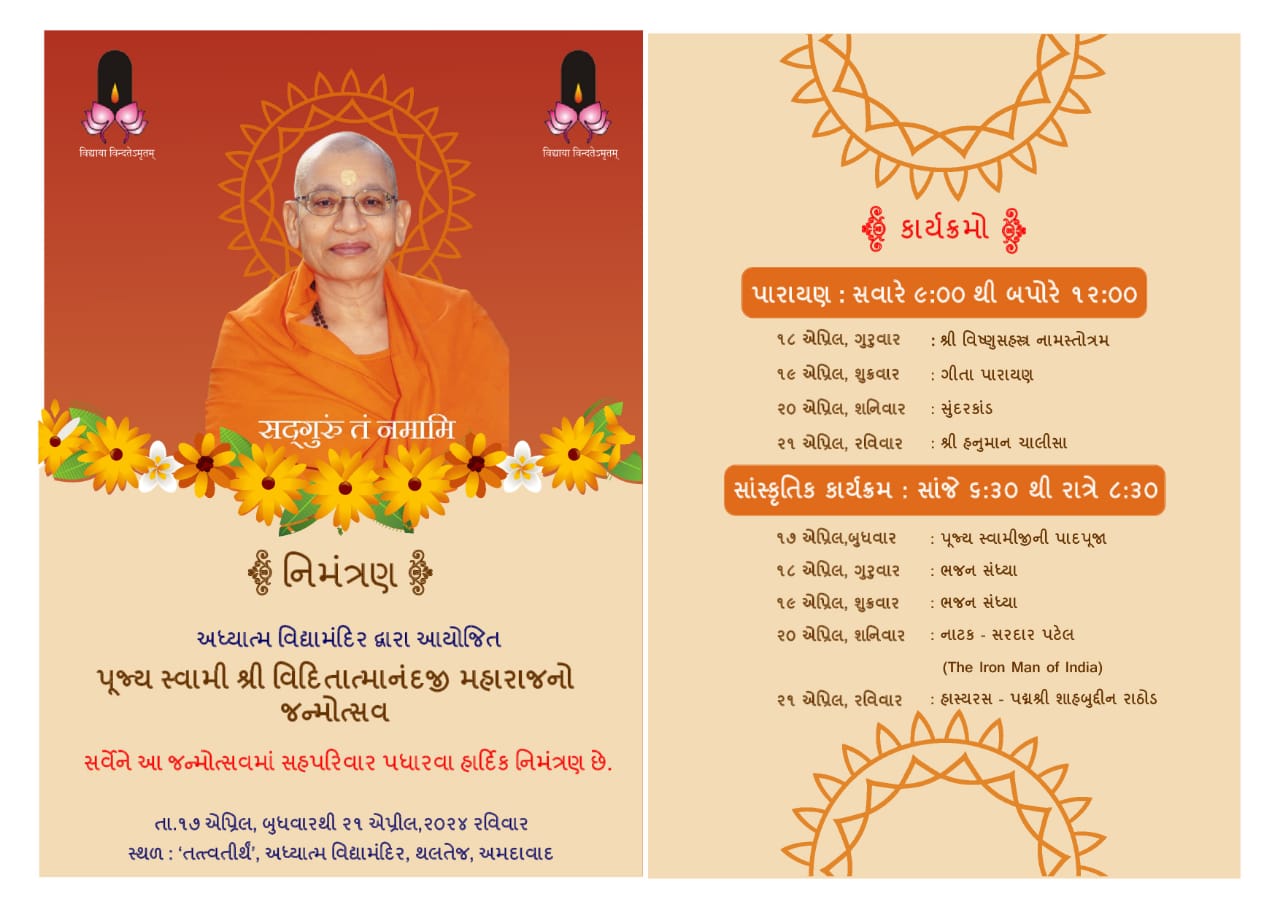Are you facing work-related stress, uncertainties and worries? Are you struggling with balancing your work and family life? Are you trying to meet ends to maintain healthy relationships at work and family? Are you satisfied with your overall performance and presence in your work and family life? Are you happy with what and how you are? Do you have a low self-esteem or lack self-confidence? Living a fast-paced life amidst competition has indeed placed today’s professionals amidst issues related to stress, self-management, leadership, managing relationships, accomplishing and monitoring success, dealing with various personalities. Recognizing this need, Adhyatma Vidya Mandir is happy to present helpful resources in the form of publications and recordings by Pujya Swami Viditatmanandaji Saraswati to address this growing need of the working professionals.
Vedanta in Practical Life
Pujya Swami Viditatmanandaji has delivered many talks at management seminars to an audience of management students and graduates of universities and management institutes addressing these issues. Adhyatma Vidya Mandir presents numerous publications addressing the fundamental cause of these issues based on Pujya Swamiji’s talks. The working professionals struggling through the issues of work and family life will find these resources as a treasure to resolve issues arising in practical life. In these resources, there is a detailed analysis of the issue at hand, such that the issue can be traced back to the cause, and help the person work on it in a holistic manner for a systematic solution. While generally management techniques are employed in manipulating external situations and people, here the focus is on the inner transformation for self-management. It is this inner transformation alone which enables one to create and maintain a poise regardless of the external situation. Management techniques of the Bhagavad Gita are primarily employed and the areas with potential of committing an error are recognized, so that one remain aware of these while interacting with the world.
An understanding of our personality and the mechanism of the mind are unfolded before us to help us analyze and evaluate the situations effectively, and help us manage relationships. We are shown how it is our expectations and demands from the people which creates conflicts in us. Important aspects of maintaining healthy relationships are discussed with simple and logical rationale. Importance of reducing expectations and demands and developing an attitude of giving, becoming sensitive to the needs of others is highlighted. This includes treating others with respect and fairness, accommodating others by understanding the limitations and faults of others, being sympathetic to the faults of others, employing forgiveness in our relationships and interactions with the world. Pujya Swamiji emphasizes investing in each relationship and maintaining the intention to do the right thing. And the two aspects of any relationship – giving and restraining have to be well-understood, and should be employed to develop emotional maturity in relationships. One should be alert so that relationships are not harmed because of personal interests. This requires clarity in mind about your intentions, having an understanding of what is important in life. One has to prioritize the time and attention accordingly, ensuring the pre-occupation of one’s own needs do not overshadow the needs of others, and recognizing the positive value of being kind, compassionate, understanding and sensitive to the feelings and needs of others. All these are important elements in maintaining healthy relationships. The focus of course is in transforming ourselves, transforming our attitude towards people and situations.
The fundamentals of life are revealed, how human life is a series of choices he or she makes. How at each moment we are faced with choices, and how there is a conflict between a choice between what is right versus what is convenient. A choice which would result in short term gain, long term pain versus that which would be a short-term pain, long-term gain. How our choices has resulted into the person we are today, how it impacts our personality. Thus, first we are made aware of the importance of the choice we make in life. Then, we are educated on making right choices in life, with guidance on what comprises a right choice, and how to make a right choice in a given situation.
As a next step, a further subtle analysis is done, of what governs the choices, the reason for conflict between the choices, and we are introduced to the concept of values. Here we are introduced to natural values which are in keeping with the universal order, and the acquired values which we have developed during our upbringing from the world around. It is our tendency towards the acquired values which results in violation of the natural values. This is what creates a conflict in our personality, and damages our personality. Thus, a value of values is emphasized by showing us the perks of long-term gain in a choice where natural values are not compromised and the harm of long-term pain in a choice where natural values are compromised.
Everyone loves non-violence, forgiveness, but then what makes them violate the natural values? Our attention is drawn towards the impulses and impulsive behavior within us. An introspection of our personality reveals these impulses of Kama – desires, Krodha – anger and Lobha – greed, which governs our actions and interactions, are the cause of various issues in our life. Recognizing these impulses within us, we are made aware of the need to address and resolve it. A self-transformation is expected from us, and we are expected to be deliberate so as to identify the root of the particular impulse arising within us. Deliberation is also called for to understand how we seek gratification at various levels: sensuous gratification, emotional gratification, intellectual gratification, ego gratification. Further the distinction between the person and personality is also pointed out, so that we can employ a two-step response in our interaction with the world. In this way understanding the processes of our mind and what governs our mind, helps us manage the emotions of our mind, and our response during the interactions with the world.
Our personality is what plays an important role in the emotions we experience and our interactions with the world. Therefore an emphasis is placed on creating an inner harmony within our personality. This is possible only when there is integrity between our activities at the level of mind, speech and action. Further introspection on what comes in way of such inner harmony revels our inner needs. And we are guided further to recognize and address our inner needs. Self-worth, self-acceptance, self-love and self-esteem is unfolded as our inner needs. We are shown how when we deliberately do something positive, we fulfill our own needs, which makes us feel good, while negative tendencies creates needs.
So what does all this analysis have to do with our issues in practical life? And again we are pointed out the two problems lingering in every situation. A fundamental problem and topical problem. A topical problem or a situational problem can be dealt with when we remain aware of our fundamental personality. Fundamental problem is thus not recognizing the difference between person and personality, between the actor and roles. Thus it is when we become one with the various roles we play in life, that we end up with various conflicts and issues. As our understanding of the mechanism of mind becomes subtle, we are able to deal with the issues tactfully, and with a further awareness of the distinction between the person and personality, we can create distance with the disturbances on account of the identification with the role.
Pujya Swamiji in these publications and lectures discusses in-depth the fundamental mechanism of mind, the impulses and how to address these impulses by positive tendencies. Further we are awakened to the fact of what we are seeking in life, and we are made aware that where we are seeking it is in a wrong direction! This is the primary cause of our dissatisfaction and conflicts with the various situations in life. We are thus awakened to our ultimate goal, and to search the truth in the right direction. Pujya Swamiji beautifully unfolds this vision of how limitless happiness is what we are seeking, how limitless happiness is not out there, but is within, because I am the limitless happiness that I have been seeking for!
Following are the study categories please click below:



